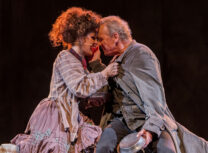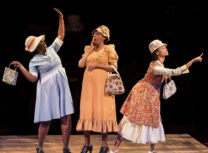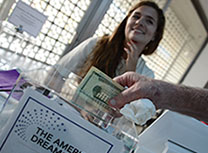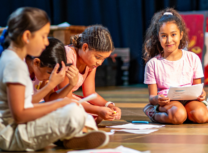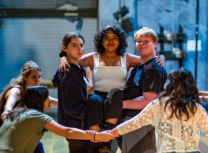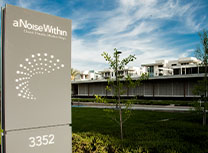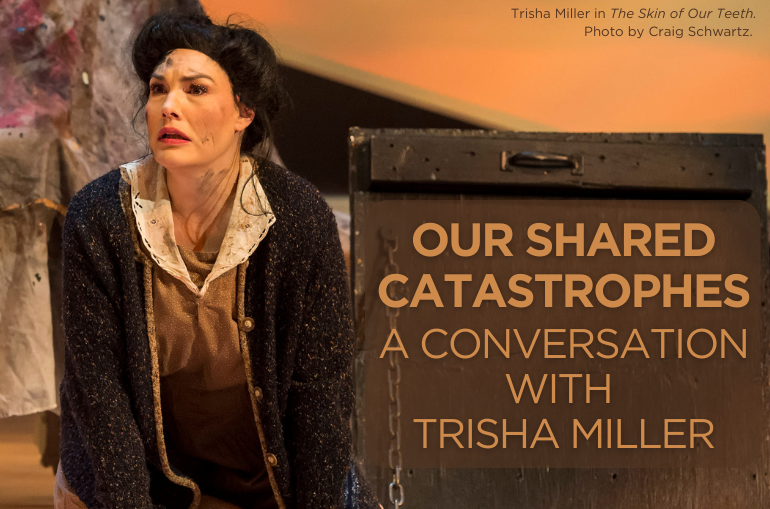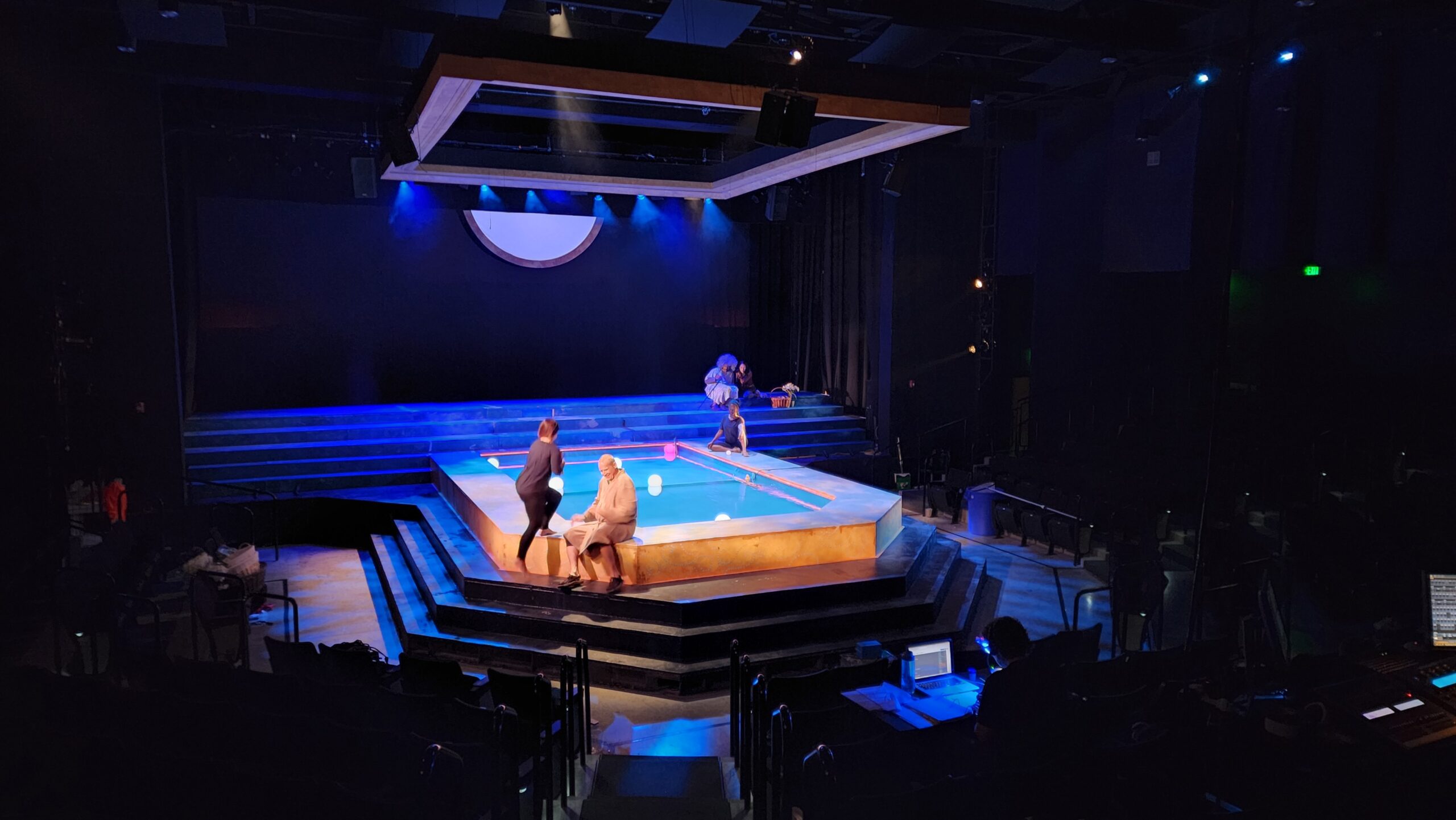Pride Month: Q&A with Kasey Mahaffy
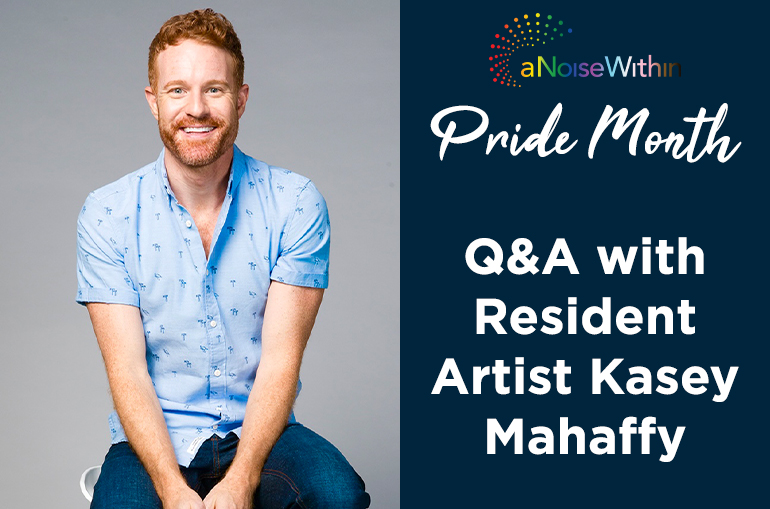
By A Noise Within
June 24, 2021
Kasey Mahaffy is a Resident Artist at A Noise Within who has played a range of roles on stage and on television. He sat with us for a Q&A about his artistic and personal journey to become who he is today!
How did you get started on your artistic journey?
When I was a little kid, I knew that I always wanted to be an actor. I’d come home from junior high or high school and turn on cable or HBO. There was usually some Tom Hanks movie playing, and Tom, he was like my idol. A lot of people say they can see him in my performance style, some of my vocal patterns and other things remind them of him. I would watch these movies and I knew I wanted to do it, but I was too chicken to audition for the school play. My parents were divorced, and so I was always moving back and forth across town, and I never really had a foundation. I think I changed schools six times in junior high.
But once it was fall term of my freshman year of high school, I was like “I am going to do theater, I am in high school, and I am going to do theater.” I auditioned for the fall production of Dr. Doolittle, and I got the role of Monkey #3. Ever since then I’ve been hooked. That’s where it started.
I continued throughout high school, and then I went and got my performance degree at a college in Ashland Oregon, where the Shakespeare festival is. And then I’ve just been traveling the country ever since.
How did you get to where you are now?
After college, I did an internship in Santa Maria, California at PCPA. I did a professional internship, touring a 45-minute production of Alice in Wonderland for a year, all over the central coast of California. We would get up at four a.m. and climb into a van and drive all around and do an assembly, usually in a cafetorium. So, I was doing Alice in Wonderland at 7am and cutting my teeth there.
Then I moved to New York and got my Equity card and did theater in New York for three years. I moved out to LA for a relationship, which actually dissolved fairly quickly, but my time in LA did not. Right when I got here, I started working and getting exciting jobs. I had just moved here from New York, and within a month I had booked this little role on Joey, which was a spin-off of Friends with Matt LeBlanc. When you’re in my generation, growing up with Friends, all of a sudden shooting that with him..! Then I booked a job on Ocean’s 13 where I was playing Al Pacino’s security technician for a couple of weeks. For a kid who never even met a celebrity to all of a sudden be working with these people in three months, I was like, “I need to spend some time here.”
What challenges would you say you faced along your path?
Oh gosh… I think my challenge, while incredibly pervasive, is not unique. I think one of the biggest lessons that I had to learn in my career (I wish I could have learned this 10 years ago), is to trust myself: to trust my instinct as an artist and to trust that the work that I do is enough and that I don’t need to amplify it or tailor it to someone else’s expectations. I think that queer people wrestle with this all the time. That’s why there’s a trope of gay men being attractive, fit, driving a BMW. We have the whole presentation down because we were not accepted. We were ostracized growing up or picked on, or told we were nothing, or our parents kicked us out, or whatever. We tend to overcompensate by being the best that we can be and being the prettiest we can be and the fittest and driving the best car and having the best house and all that.
But I think on a personal level, my life really blossomed when I quit drinking seven years ago, and I think had I done that even earlier I would be in a different boat. No regrets, but I did spend a lot of time partying and seeking the approval of others rather than just going my own way and trusting myself. That’s what I mean by trusting myself. Instead of getting lost in “booze and boys,” that’s what I call it, and trying to please them and be accepted and being told that I was pretty and being told I was talented and getting lost in all that, I should just follow my own North Star.
But bright side, through meditation and my sobriety and everything, I have learned to do that before 40, and now I am 41 and things are well, I’m with a theater company, and I do TV. And I am glad, some people never learn this lesson. Some people never learn.
How did you find and end up at ANW?
I had a director friend who I worked with previously a few times. He was directing a production of The Tempest at ANW. I had auditioned for ANW before, but it had never worked out. My friend brought me to The Tempest, playing Trinculo the clown. That was in 2014, and then I was doing shows periodically for 2 years. They would call me once in a while, but then I got back-to-back King Lear and Man of La Mancha together. They were being produced together in the same set and a lot of the same cast, and when that happened, I think I proved my mettle. I became a Resident Artist that spring. Both roles, the Fool in King Lear and Sancho in Man of La Mancha, were played under Geoff. Literally, physically helping him off the floor in both plays. I just tried to prove to him that I was there for him in both productions, that I would be there, I wouldn’t miss a beat, I would pick him up off the floor. That journey for him is one of the hardest things an actor has to do, doing both those plays at once and I just tried to support him and be there.
I have an interesting story that I wanted to share about King Lear and the gay thing.
So, I was cast as the Fool in King Lear, which is an inarguably an impossible part. There are no active verbs or anything, everything is spoken in riddles and rhymes and circuitous language that is not very active. So, it’s a hard part to sell jokes that are 400 and some years old. So, I wasn’t good at all in the rehearsals, and Julia was directing and pulled me aside. She said: “You know, what if … he’s gay. What if once the palace goes dark at night and the king goes to bed, what if he leads a drag show in the palace at midnight and people come? He is known for this type of entertainment, and, you know, being drag and gay and fabulous.” And that sort of blew open this whole new idea. They bought a bunch of makeup for me, and I started doing my face and all this different sort of stuff, and that’s what we settled on. We opened the show to my portrayal of the Fool which was incredibly queer and done – not in drag, just in a suit, but the makeup was like drag.
We had our first student matinee, and I was so nervous. I was more nervous than I had ever been for any play in a long time. I think it had to do with the fact that before I even knew I was gay as a kid, I was called f*g. I was chased around school, and I was shoved in lockers. I had all the cowboys. I grew up in a hick part of Oregon. These guys with cowboy hats would chase me around after school, and I would have to hide. I didn’t even know I was gay. I just knew I was different. My whole life I had been made fun of for that.
Kids notoriously can be pretty cruel, and I was wondering, “Why am I so nervous for this student matinee?” When I was putting on my makeup it all hit me, and I thought: “Oh God it’s because I am going to go out in front of 300 middle schoolers, in this makeup, and be femme, and I’m going to get made fun of. They are going to laugh and it’s going to be terrible.”
I had this entrance when I came in with this suitcase – I could see Geoff on the stage and my heart was pounding out of my freaking chest. Right when I walked out, I started. The Fool’s giving King Lear a really hard time in the beginning just ‘jab jab jab’ and I was jabbing Geoff and flipping my hair and doing this thing. All the kids were mumbling. I was thinking: “Get me through this scene, get me through this scene. Kids are going to start screaming things.” I had a joke at the end of the scene, and they all laughed. I had come to realize at this moment that they were not making fun of me, but that they were perhaps on my side. At curtain call, I received an uproarious, crazy standing ovation – they had been normally clapping, and when I came out, they were like “WHOA!” These kids went crazy, and I realized that I did them a disservice by telling them how they were going to feel about me because of my own past, my own fear.
I think I learned at that moment to not judge myself so harshly and to allow myself to be surprised by the goodness in people and how far we have come. These kids… It was 2017, they are different than kids in the early ’90s when I went to high school. It’s a different generation, these kids are in California as well, and they ate it up, they loved the queer Fool. They wanted more of it, and that was just a very profound moment for me as a queer artist and as a member of a company at ANW. It really was one of the most educating moments of my career.
I was thinking about that because it was a profound artistic experience and personal experience and it taught me a lot. Gay people can be homophobic, and I still carry some of the inner homophobia from growing up. My husband is decidedly more femme and out and fabulous than I am. He enjoys wearing all kinds of jewelry, and caftans that go to the floor. He is unapologetic, and when we were first dating, I would sometimes ask, “Wow are you… you really gonna wear that….?” But I realized in watching him that every time he would enter a room, everyone loved him! Even these hick-looking people in Oregon, when we would visit, they were just “Oh, this guy’s a riot!” I realized the only one doing him a disservice was me, not people, and that maybe I was bringing my past too much into my present and future. Here is this unapologetic and bravely gay man that I love more than everything! Ever since then I urge him to fly whatever flag he wants. Whatever he wants to wear out to dinner, whatever he wants. If he wants to wear a dress, great! Because I am done with judging the reactions of others – or prejudging them, I should say.
How would you say your personal identity, culture, history, or anything else in your background influence your work as an artist?
I have an innate openness in me that allows me access to my feelings and to my imagination pretty easily. I think that a lot of gay men might have this experience that I have access to, which is that emotional life and creativity. It allows me to personalize my work a little bit more. When we were doing Man of La Mancha, I was so scared one week into rehearsals, I pulled Julia aside and asked: “What are we doing? I’m grateful for the opportunity. Sancho is always rotund, often Italian, or the portly borsch belt humor kind of guy. I’m a six-foot gay, redhead, young man. I look like Justin Timberlake or like I’m like in a boy band. I am not what people are expecting in this part, I am really nervous.”
She put her hand on my shoulder and said: “But that’s what makes it so beautiful. That’s what makes this so right. You are the unexpected. This is not an accident. I wasn’t in a panic and put you in this role. Everything you bring in life I wanted in this part. And that’s why it’s so beautiful when Don Quixote dies in the end and you are mourning him. Because you are bringing your truth and your essence and that accessibility, and that’s what makes this production so special.”
I just was so blown away by that, and I’d like to think that maybe my access to emotion and imagination has helped. I think a lot of queer people have that. That special thing.
Out of all your accomplishments in the arts, what are you most proud of?
This is so dumb because awards don’t mean anything, but I think the crazy hard work that Rafael and I put into Rosencrantz and Guildenstern Are Dead. I won the best actor for LA Drama Critics Circle, and I tied with Tom Hanks. Imagine, the guy who was the reason I got into this, the artistic North Star for me, and we tied for this award for best actor on stage in LA. I think that journey with Rafael, and Geoff at the helm, already meant so much to me and to be rewarded by that and to take this home and tell my parents, “Look what I did.” That was a big thing.
Another landmark in my career just would be my recurring part in Modern Family. I got to do 10 or 11 episodes. Not only has it been great financially, but it allowed me to do theater in LA with residuals and stuff coming in. It was validation. I know we shouldn’t seek that from the outside, but it was validation, you know? Here you get to play with all these big-time actors and we’re going to keep having you back. Both of those things felt good.
Who is your favorite LGBTQ+ author/playwright/artist? What is your favorite work of theirs?
Oh, boy. I don’t know. Playwrights, we need more. I love Terrance McNally. I love Matthew Lopez, who wrote The Inheritance. I love their work, but I am looking for more. Obviously, Angels in America was a formative piece of theatre as a young gay artist. So, Tony Kushner has been amazing with that. A quick shoutout to Larry Kramer – The Normal Heart. I was living in New York, and I saw Raul Esparza do it off-Broadway at The Public, and that changed my entire life.
I guess one of the most formative for me, it’s not really a sexy answer, was a mentor I had. His name is Patrick Kerr. He’s a character actor, he did every sitcom in the ’90s that was possible. I mean Friends, Will and Grace, all those. He’s a theater actor and I met him while understudying for him, and he’s gay. He’s a genius. He’s a comic genius certifiably, and I learned pretty much everything from him. He was the person I learned comedy, timing, that kind of stagecraft. He was apologetically brilliant and gay. He’s a dear friend of mine, but I still try to emulate him a lot.
It’s tricky to think about this. It’s also tricky finding my artistic home and being involved in a classic theatre company that does classic plays and there are no classic gay plays. There are no classic plays that are centered and themed around the queer experience. I want to do all characters. It has nothing to do with gay or straight. I usually play characters who wouldn’t define themselves as gay necessarily. The Fool in King Lear was a great way for Julia to work that in. I am looking forward to any possible artistic opportunity at ANW to play a gay character. I would like us to do McNally or Angels in America.
